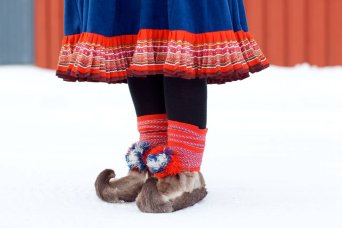- About
- Topics
- Picks
- Audio
- Story
- In-Depth
- Opinion
- News
- Donate
- Signup for our newsletterOur Editors' Best Picks.Send
Read, Debate: Engage.
| topic: | Indigenous people |
|---|---|
| located: | Finland |
| editor: | Abby Klinkenberg |
As the European Union’s only recognised Indigenous people, the Sámi community native to the northern swaths of Norway, Sweden and Finland - formerly known as Lapland - does not benefit from political precedent. For both rights and recognition, they must carve their own path through the thick web of European bureaucracy. While Sámi self-determination has been meaningfully recognised in Norway and Sweden, in Finland, the battle is far from over. Despite the seminal establishment of the Finnish Sámi Parliament in 1973 after centuries of state-sanctioned oppression, Finland has again failed to protect the political rights of the country’s Sámi population.
In June 2022, the United Nations Committee on the Elimination of Racial Discrimination (CERD) released their findings regarding who is eligible to vote in elections for the Finnish Sámi Parliament. The Finnish Sámi community of approximately 10,700 people has been incensed by the Finnish Supreme Administrative Court’s decision to allow individuals who claim Sámi identity to be added to the Sámi Parliament’s electoral roll. By circumventing the Sámi Parliament in this decision, the Finnish state has infringed on the community’s right to self-determination.
In 2019, the United Nations Human Rights Committee (UNHRC) similarly condemned the Finnish government’s actions to widen the Sámi voting register without consent. One would imagine that the condemnation of two United Nations human rights committees in such rapid succession would inspire action on behalf of the Finnish government. Unfortunately, the Sámis’ situation remains stagnant.
These official blights on Finland’s human rights record would be largely repaired with the passage of reforms to the Sámi Parliament Act, which outlines the intergovernmental relations between the Sámi and Finnish Parliaments. For nearly ten years, the reform has been the subject of continuous and contentious debates between both sides: it has “previously been revoked in 2014 by the Finnish government and in 2018 by the Sámi Parliament.”
Despite the promises made by current Finnish Prime Minister Sanna Marin to prioritise the passage of reform to the Act, she has not advanced the legislation in Finnish Parliament. On 29 October, Prime Minister Marin apologised for the delays in enacting reform-related protections for the rights of the Finnish Sámi people. Apologies, however, are insufficient.
The five-party coalition government led by Prime Minister Marin is trapped in a stalemate: while four of the parties are committed to advancing an updated Sámi Parliament Act, the Center Party refuses to lend its support. The Center Party’s reluctance to recognise Sámi rights is rooted in its rural voter base and its insistence that Sámi lands and culture should be subject to Finnish designs and norms. The Center Party contends that the ‘Kemi Sámi’ should be allowed to join the voting register for the Sámi Parliament despite the fact that the Kemi Sámi language went extinct over 200 years ago.
Given Sámi reliance on language as a key aspect of cultural identity, most Sámi people see the Kemi Sámi as Finns who do not share the same socio-cultural norms and values. The Sámi Parliament is particularly concerned by the deterioration of Sámi political identity inflecting land-use in non-traditional directions. As Inka Musta, a Sámi environmental consultant, told EuroNews: “The Sámi Parliament is the only place where we can defend our language, our culture, our livelihood and if we lose that we don’t have anything.”
With the Finnish Parliamentary elections on the horizon in April 2023, it is unlikely that Prime Minister Marin will advance the divisive legislation before the end of this parliamentary term. There is no question that the Finnish Sámi should be able to determine who is a member of their political community. After centuries of social exclusion and colonial subjugation, the Finnish state has a duty to recognise the Sámi and respect the ways in which the community defines itself and protects its social institutions.
Image by Riku Pihlanto

